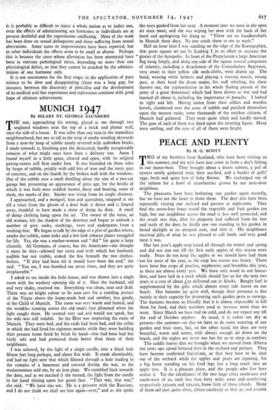MUNICH 1947
By HILARY ST. GEORGE SAUNDERS
THE sun, approaching his setting, glared at me through two unglazed windows near the top of a brick and plaster wall, once the side of a house. It was taller than any ruin in the immediate neighbourhood, but not so tall as the wisp of smoke winding skywards from a near-by heap of rubble neatly revetted with unbroken bricks. I made towards it, brushing past the desiccated, hardly recognisable remains of what might once have been a delivery van. Anon I found myself in a little space, cleared and open, with its original paving-stones still firm under foot. It was bounded on three sides by heaps of rubble, prickly with odd bits of iron and the rusty guts of concrete, and on the fourth by the broken wall with the windows. Out of the rubble rose a small dwelling about the size of a two-car garage but presenting an appearance of great age, for the bricks of which it was built were reddish brown, dusty and bearing, some of them, the marks of fire. Smoke was rising from its single chimney.
I approached, and a mongrel, lean and querulous, snapped at me till a voice from the gloom of a door bade it desist and it limped away, thankful to have made a show of doing its duty. A smell of damp clothing hung upon the air. The owner of the voice, an old woman, left the shadow of the doorway and began to unhook a number of grey socks, stockings, vests and underpants from a washing-line. We began to talk by the edge of a plot of garden where, amidst the rubble, some leeks and a few lank tobacco plants struggled for life. Yes, she was a washer-woman and " did " for quite a large clientele. All Germans, of course, but the Americant—she thought it must be they—allowed her extra coal with which her husband, audible but not visible, stoked the fire beneath the two clothes- boilers. " If they had been hit it would have been the end," she said. "You see, I was bombed out seven times, and they are quite irreplaceable."
I asked to see inside the little house, and was shown into a single room with the washery opening out of it. Here the husband, old and very shaky, received me. Everything was clean, neat and drab. There was no bright colour to be seen save for a startling picture of the Virgin above the home-made bed and another, less gaudy, of the Child of Munich. The room was very warm and humid, and the wrinkles running across the old man's face glistened when the light caught them. He seemed very sad and would not speak, but his wife was still voluble. So the Herr was inspecting the ruins of Munich. They were bad, and the raids had been bad, and the cellar in which she had lived for eighteen months while they were building their present home brick by brick by hand—that had been bad but fairly safe and had protected them better than those of their neighbours.
I was ushered, by the light of a single candle, into a black hole fifteen feet long perhaps, and about five wide. It stank abominably, and had no light save that which filtered through a hole leading to the remains of a basement and covered during the war, so the washerwoman told me, by an iron plate. We stumbled back towards the door, and as we reached it she turned, the light from the candle in her hand shining upon her gaunt face. "That war, that war," she said. " We have one son. He is a prisoner with the Russians, and I do not think we shall see him again—ever," and as she spoke
the tears gushed from her eyes. A moment later we were in the open air once more, and she was wiping her nose with the back of her hand and apologising for doing so. "There are no handkerchiefs in Munich these days. No one sends them to me to wash."
Half an hour later I was standing on the edge of the Koenigsplatz, that great square set out by Ludwig I in an effort to recreate the glories of the Acropolis. In front of the Propylaeum a large American flag hung limply, and along one side of the square several companies of infantry, including a detachment of the Constabulary Regiment, very smart in their yellow silk neck-cloths, were drawn up. The band, wearing white helmets and playing a rousing march, swung past, at their head the drum major, his staff whirling, his chest thrown out, the representative in his whole flashng person of the army of a great democracy which had been driven to war and had learned all about it, including the importance of panache. I looked to right and left. Having stolen from their cellars and wooden hovels, clambered over the acres of rubble and perched themselves upon the nearest ruins, some thousands of the stricken citizens of Munich had gathered. They were quite silent and hardly moved. The gaze of each of them was fixed upon the strutting figure. Many were smiling, and the eyes of all of them were bright.






























 Previous page
Previous page